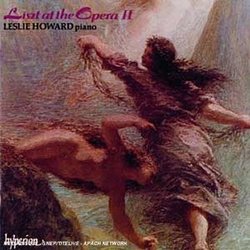| All Artists: Franz Liszt, Leslie Howard Title: Liszt at the Opera II Members Wishing: 0 Total Copies: 0 Label: Hyperion UK Original Release Date: 1/1/1992 Re-Release Date: 11/19/1993 Album Type: Import Genres: Special Interest, Classical Styles: Marches, Opera & Classical Vocal, Chamber Music, Historical Periods, Classical (c.1770-1830) Number of Discs: 2 SwapaCD Credits: 2 UPC: 034571165714 |
Search - Franz Liszt, Leslie Howard :: Liszt at the Opera II
CD Details |
CD ReviewsLiszt the Impresario - Part 2 Hexameron | 08/20/2006 (5 out of 5 stars) "Surely, there is nothing on this 2-CD Volume other than the Wagner-Liszt "Pilgrim's Chorus" from Tannhauser that will be familiar to most collectors. Leslie Howard and Hyperion unveil a miraculous repertoire that has been almost permanently neglected. Few devout Lisztians even know of the gargantuan epic fantasy (40 minute) 'Illustrations' on Meyerbeer's "Le Prophete." Here Liszt demonstrates his advanced and artistic conception of opera paraphrase: a large-scale work comprised of three movements or fantasies on thematic material from Meyerbeer's opera. Liszt indulges in the Thalbergian with deft and often grandiose virtuosic embellishments, but he also achieves musical continuity and interesting elaborations. At times Liszt's musical treatment is exhilarating, impressive, dramatic and ultimately superbly conceived on the piano. To put it simply, this is memorable and stirring piano music. The "Fantasy and Fugue on Meyerbeer" is of another cloth. This 25 minute essay is most often performed as an organ piece, but I believe Howard's and Parson's four-hand piano delivery is superior: melodic lines, inner voices, and every nuance of texture is illuminated on the piano. The work itself displays virtuosity, sonority and intensity in a mature non-salon composer fashion. This beefy work also differs from the previous "Illustrations" because Liszt really constructs his own original fantasy, variations and fugue on one theme. The "Fantasy" is a thick-textured, violent, and dramatic powerhouse with unending strands of lyricism. The contrasting "Adagio" is a delicate, painfully tender work of angelic beauty. A climax of transitional apocalyptic chords ensues and leads right into the "Fugue." Here Liszt matches the polyphonic mastery of Mendelssohn and Brahms, but imbues his counterpoint with electrifying virtuosity and musicality that are simply irresistable. Meyerbeer loved this composition and even considered setting it to an original opera. Busoni understood its intrinsic worth and edited the work into a concert piece for solo piano. It definitely belongs in the colossus category of Liszt's piano music, resting comfortably with the B minor Sonata and Grosses Konzertsolo. The next disc showcases transcriptions and paraphrases of Donizetti, Spohr, Gounod, Mosonyi and Wagner. The 'Spirto gentil' is an unpublished transcription from Donizetti's "La Favorite" and is an introvert but gorgeous gem. Liszt creates marvelous tension and release in the 'Funeral March' from Donizetti's "Dom Sebastien," an utter rarity that should be heard more often. The reflective 'Die Rose' from Spohr's "Zemire und Azor" and Gounod's tranquil 'Berceuse' from "La reine de Saba" were famous numbers in their day; Liszt's transcriptions are impeccable. Liszt's fantasy on Mosonyi's "Szep Ilonka" is another remarkable work of energy, ingenious melodic elaboration and thrilling passagework. It would be daft to describe each of the Wagner transcriptions; they speak for themselves as tremendous monuments to the German master. I am a natural believer that Wagner's music is marvelously suited for the piano and am ecstatic over Liszt's transcriptions; he solves all technical issues and continuity problems that plagued so many editors and arrangers in the 19th century. Leslie Howard also feels the music keenly and conveys brilliant interpretations. Bottom line: This is another milestone in Leslie Howard's recordings of Liszt. There are works of rip-roaring virtuosity and dazzling spectacle that are aural feasts for the pianophile. But I think some of these paraphrases and transcriptions are also of a profound and mesmerizing caliber, namely the Illustrations and the "Ad nos" Fantasy and Fugue on Meyerbeer. These compositions have remained hidden from connoisseurs and laymen alike, and they are weighty creations of stupefying power." Amazing operatic transcriptions christopher_m | 01/12/2000 (5 out of 5 stars) "The first disc is dedicated to Meyerbeer. Needless to say, Meyerbeer himself was quite impressed. The last track features two piano players. The second disc is distinguished by Liszt's great Wagner transcriptions--the Parsifal is more of a fantasy on that opera, and it's marvelous, as are the other pieces. A really enjoyable set of transcriptions, played superbly by Leslie Howard." A revelation! christopher_m | suburban Washington DC | 04/24/2002 (5 out of 5 stars) "I find that the most interesting and impressive work in this compilation is the Fantasy and Fugue on the "Ad nos, ad salutarem undam" chorale, which (like me) you may already have known in its version for organ. I was surprised by the grandeur it retains in the piano 4-hand version presented here. As Leslie Howard writes in the accompanying notes, it truly is one of Liszt's finest efforts, really in the same class as the B Minor Sonata. Playing and recording quality reflect the same high standards you will find in all of Howard's Liszt series on Hyperion."
|

